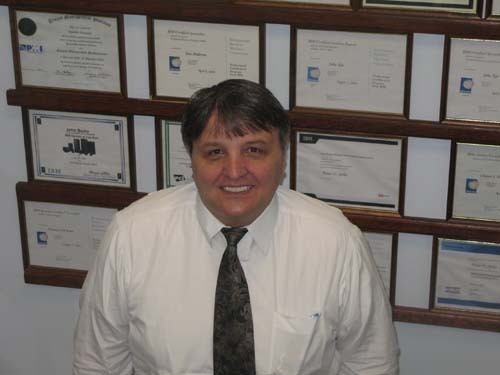
Lighthouse Computer Services has partnered with the Tech Collective to award three $1,000 scholarships to students affiliated with military service and entering information technology, management-information systems or computer science fields.
The scholarships are part of a Tech Collective effort to grow and strengthen the IT-sector work force through education. Lighthouse had worked with Tech Collective leaders to find ways it could help. The grants were one of the resulting ideas; at least one other company has plans to offer scholarships as well. More information is available at www.tech-collective.org.
Tom Mrva, CEO of Lighthouse, recently spoke with Providence Business News about how the scholarships fit with his company’s goals.
PBN: You have about 110 employees. How many are in IT, and where do you hire from?
MRVA: About 65 percent. … Most of the people who do work for Lighthouse have a minimum of 15 years’ experience, and they have a very focused set of skills. We have a recruiter who is constantly out there trying to find resources. Right now we are looking for seven or eight people; we are constantly looking for good people. We are in hiring mode. In fact, last year we hired 28 people.
PBN: So you have a large need for workers, but not a lot of supply locally. Does creating the scholarships in any way help Lighthouse, or will they build the work force at a lower level?
MRVA: We look at it as giving back to the community. If we can excite people to get into the field, it’s good for Rhode Island, it’s good for everybody. I don’t anticipate somebody going through the scholarship – maybe they could eventually work for Lighthouse, maybe not – it’s really part of what I think is important to Rhode Island and the local colleges. … And my hope is that students will go into the fields that are in demand.
PBN: Where do you see the biggest need?
MRVA: In this country, we have very serious security breaches all over the place, and people don’t have the skills today to help companies secure their computers. It’s really, really difficult. It’s not something you can just learn in one class. The whole thing about securing your computers and your networks is rather involved, and it takes years of training and mentoring to understand how to do that right. … There is a huge shortage of highly skilled people in that area, and there are government regulations – for hospitals, for the credit card industry – and a lot of companies don’t have the expertise on the IT side to protect their resources.
PBN: Given that, is education a hot topic among IT leaders in Rhode Island right now?
MRVA: Oh, absolutely. When you go to college – years ago it was like, “I got my degree, I get into a business and I’m all set for life.” Those days are over. When you think about being successful in the IT world, training and education is a way of life. We spend a fair amount of money getting our employees certified and trained every year. So you always have to enhance your skills, or you will become obsolete in a few years. … Lighthouse focuses on high-risk areas. The companies that come to us want us to help them avoid any potential violation or having their computers shut down during a critical part of the day. So if we are focusing on high-risk areas, we need to make sure we have the best-trained people available.
PBN: You mentioned you have had a senior security-engineer vacancy for a year now. Given how high-skill some of your jobs are, and how many years it would take to train people for them even if you started today, what are the alternatives? How will you fill the jobs? Are you going to import workers?
MRVA: If we could import more workers … I don’t know what the rules are, but it’s not easy. But in the industry now, after you graduate from college, it’s the mentoring process that is really important to developing top-notch skills. I think there’s a big hole there, and it’s not just giving an education – it’s giving the experience you need, the confidence you need, to be able to get the skills you need. So that’s another business problem that companies in New England need to solve: How do we get to the next level? How do we mentor these people?
PBN: Is that a tough thing for companies to do?
MRVA: The thing is, if you invest in a person after college, and you mentor them for two or even five years, they are probably going to get job offers all over. So you risk losing these individuals after you’ve invested a lot of money in them, which is why at Lighthouse we tend to hire highly skilled people right out of the gate. It’s something that the industry has to look at more. But I think the scholarships are one way to start. How we change and improve that will evolve as we get more involved with Tech Collective, identify the business needs, and figure out how we get where we need to be. It’s not easy.
PBN: Why did you choose to gear your scholarships to military people?
MRVA: I know a number of families that have children fighting in Afghan-
istan and Iraq, and I hear all these stories about what their experiences are like being out there for months or years. We will send them care packages … and we have a number of people who were formerly in the Navy or the Army or the Marines that work for us. I just have a passion for people in the service, and I think everyone should do more to help them out. •










